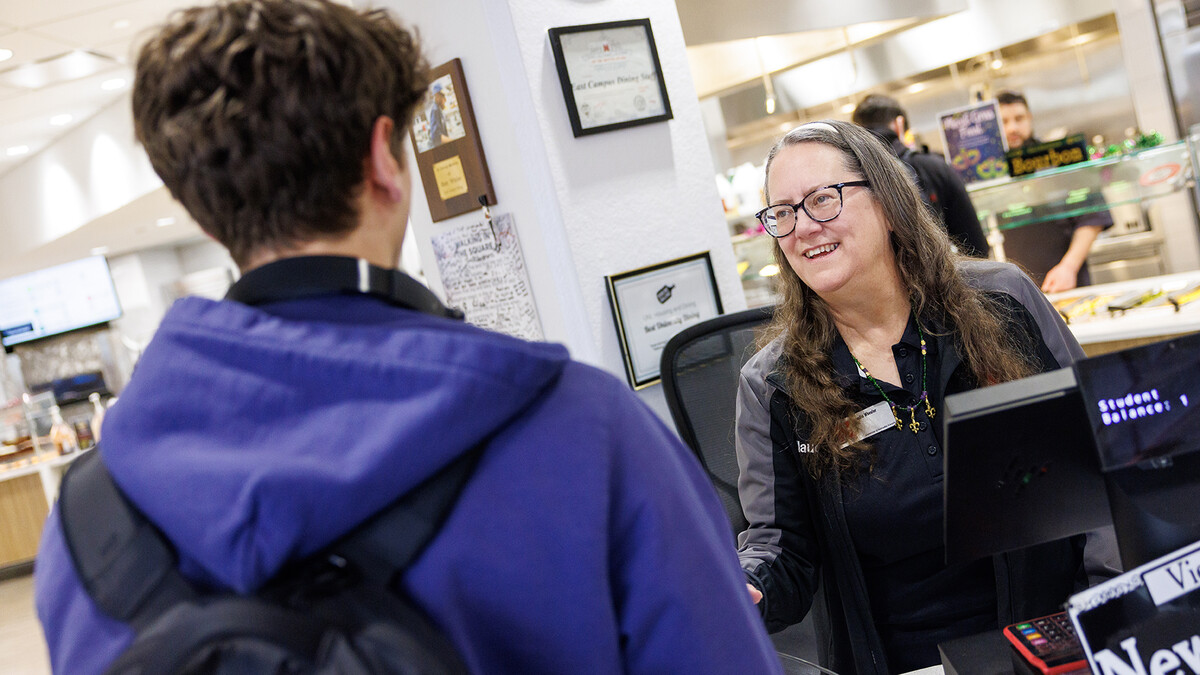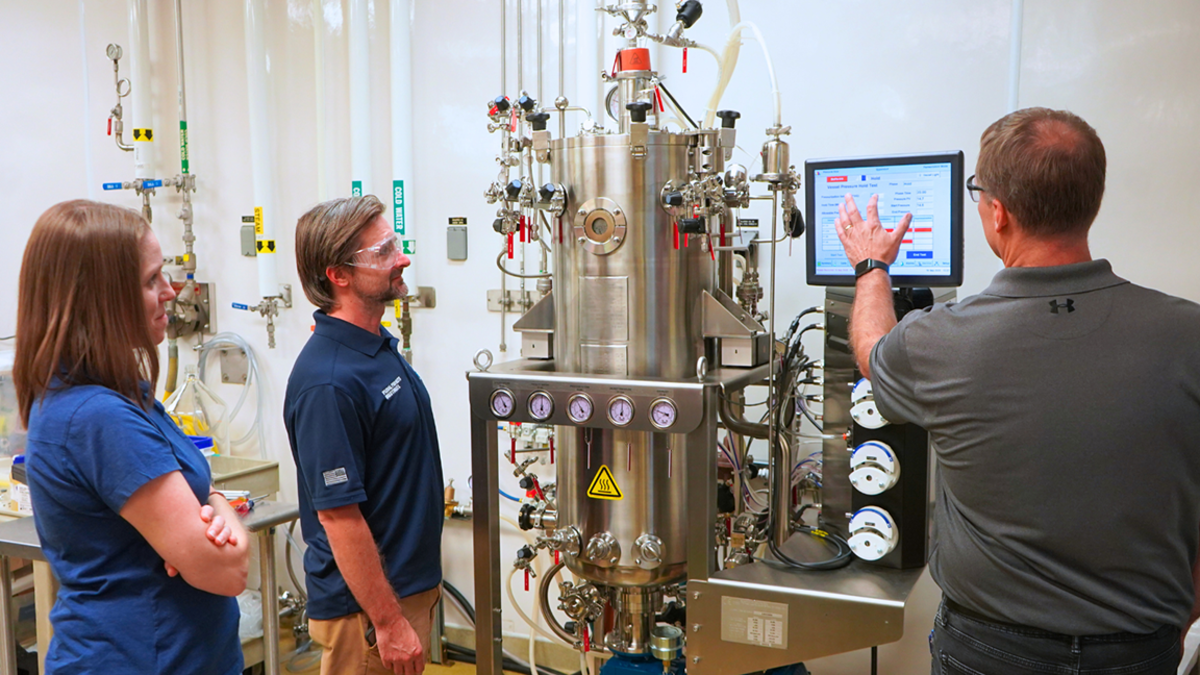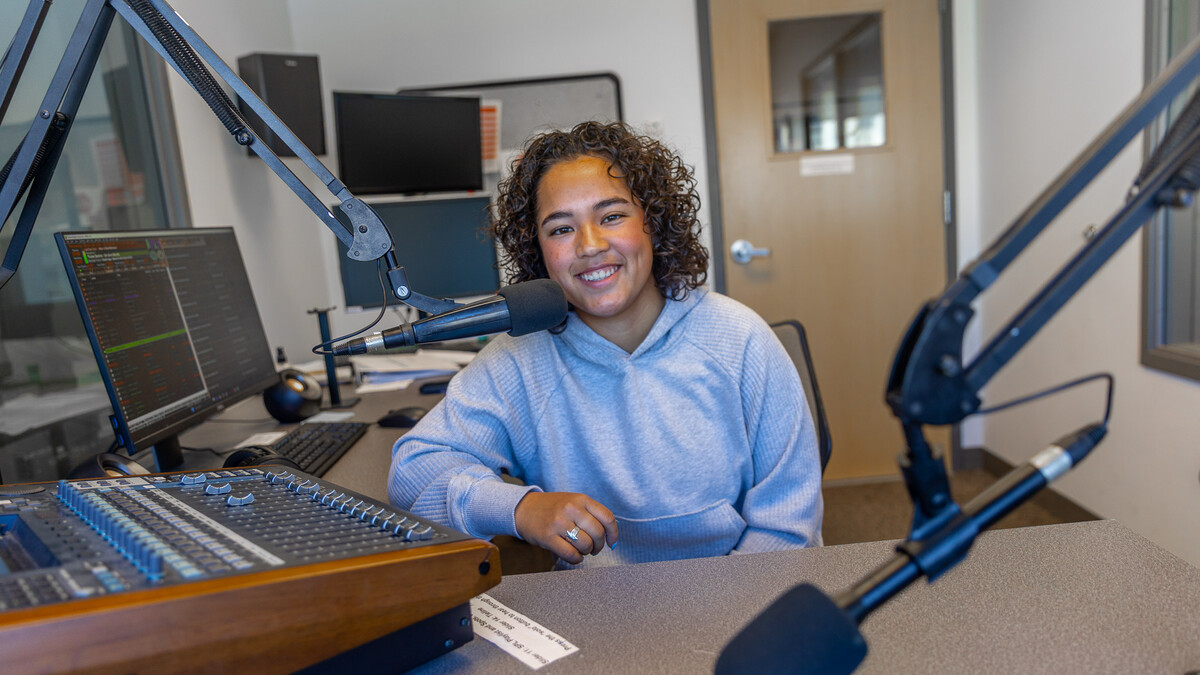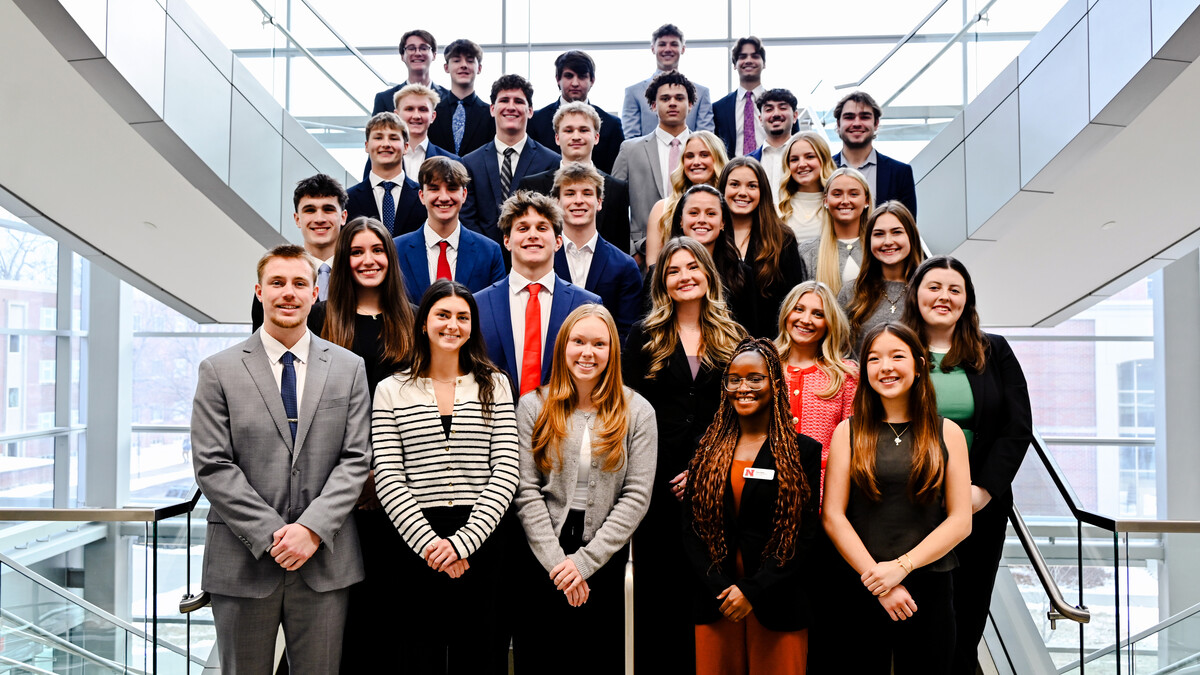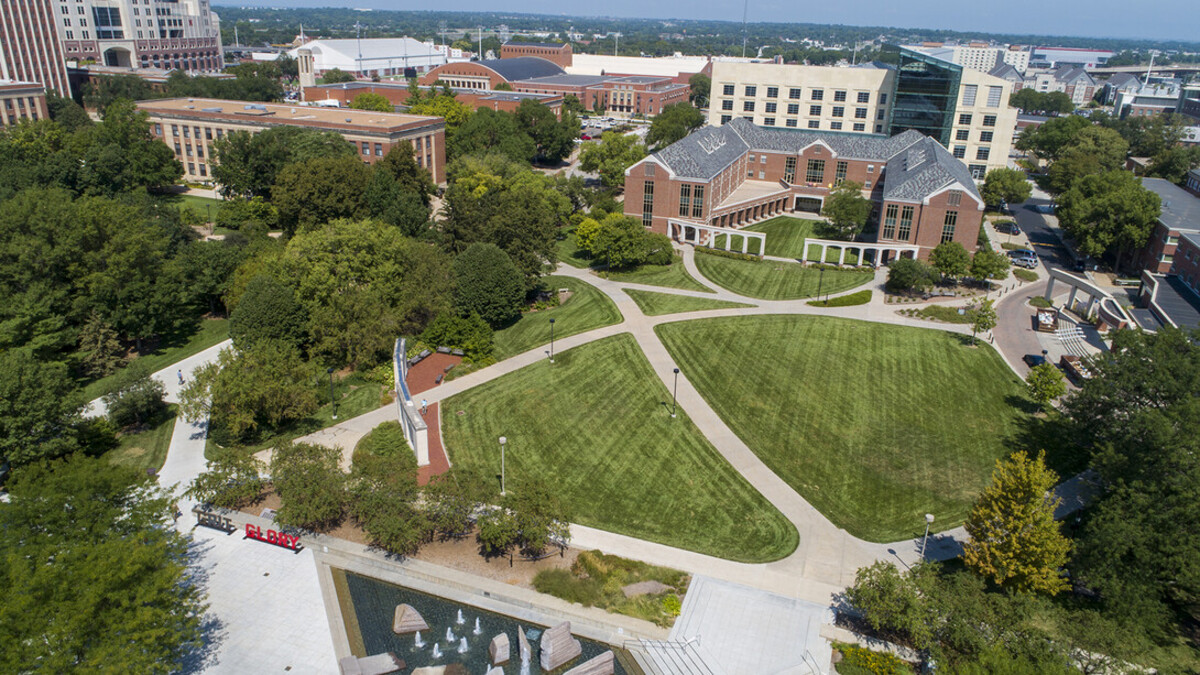
A Husker faculty member’s work on a video game reboot and the Lied Center for Performing Arts’ innovative response to the COVID-19 pandemic made national news in May. The stories were among 40-plus featuring University of Nebraska–Lincoln faculty, staff, students, centers and programs during the month.
Margaret Huettl, assistant professor of history and ethnic studies, was one of three historians who consulted on the new “Oregon Trail” video game. Huettl, who has Lac Courte Oreilles Ojibwe tribal ancestors, researched old photos and drawings for accurate depictions of different tribes’ clothing and style. She was interviewed for a May 12 NPR article on the game.
“Initially, all of the Native people [in the revamped game] had braids,” she said. “And I think we suggested, maybe they don’t all have to have braids.”
Huettl also advised that Native trappers at the time were more likely to carry a rifle than a bow and arrows, which is a stereotype.
She said the game designers were serious about getting it right and that the prairies she knows well are beautiful in the game.
“They listened to what we were saying,” she said.
USA Today published a May 18 article on the Lied Center’s programming during the pandemic — a mix of online, in-person and hybrid shows. The bicycle-powered concert series Music on the Move, the Sept. 26 performance of the off-Broadway hit “NEWSical the Musical” and the March 16 performance by Irish singer Michael Londra were highlighted in the story.
According to Bill Stephan, the Lied’s executive director, a combination of factors allowed the venue to carry on: a staff willing to learn how to work donated equipment to shift programming online; a physical space that venues in bigger cities couldn’t offer; carefully thought-out safety protocols; and the generosity of the community, including Friends of the Lied and corporate sponsors.
Donors understand the Lied, Stephan said.
“They also really appreciate the fact that we didn’t just shut down,” he said, “that we found a way to continue to bring the arts to the community, and they wanted to thank us, as well as be part of it.”
More coverage:
Jessica Shoemaker, law, was interviewed for a May 1 Mashable article on Black farmers teaching each other how to make money growing hemp after being denied loans. She said trouble obtaining USDA loans is the all-but-standard experience of Black farmers in the United States, but this could be the moment for lasting change. “It does feel like we’re at a political moment [where] people are paying attention to this with energy that they haven’t before …,” she said.
Nebraska Extension studies were cited in a May 3 Civil Eats article on no-till farming. According to the studies, occasional tillage may be beneficial every five to 10 years to manage weeds, prevent soil compaction or incorporate a soil amendment. Extension concluded that any loss in soil organic matter is recovered within a year of the tilling event.
Justin “Gus” Hurwitz, law, director of the Nebraska Governance and Technology Center, wrote a May 3 op-ed for Inside Sources on the Johnson & Johnson vaccine pause and how the U.S. government approaches risk. “Ongoing assessment of our approaches to risk — including retrospective analyses and periodic guidance to agencies and to Congress — should be a basic function of the federal government,” he wrote. “It is crucial that we continually update our priors, learning from past experiences to better prepare ourselves for future circumstances.”
Hurwitz was interviewed for a May 14 Bloomberg Law article on Snap and Amazon appellate rulings paving new paths to tech liability. “The hard question that Section 230 cases have struggled with for a decade-plus is when the platform is trying to direct the speech,” he said, or when it “encourages certain types of speech.”
Hurwitz was also interviewed for a May 25 Sinclair Broadcast Group story on a new Florida law that would fine tech platforms for banning political candidates and subject them to lawsuits from users for removing content. He said there is “no question” the law violates the current understanding of the First Amendment and that such measures could do lasting damage to public discourse about these issues.
A team of Nebraska middle and high school students, mentored by Nebraska Engineering undergraduates, will have their satellite placed into Earth’s orbit by NASA. The Big Red Satellite Team held a weather balloon launch April 24. CBS Los Angeles aired a May 4 story on the launch.
By compiling and analyzing mollusk fossil data from the past 145 million years, Will Gearty, biological sciences, and colleagues have shown that temperature largely explains the diversity of aquatic life in the tropics. Human-driven global warming is expected to reduce that biodiversity in coming centuries. Stories on the research appeared in Bioengineer.org, the Environmental News Network, Phys.org, ScienceDaily, Scienmag and several other media outlets.
The U.S. Drought Monitor — produced jointly by the university’s National Drought Mitigation Center, the National Oceanic and Atmospheric Administration and the U.S. Department of Agriculture — was cited in a May 6 SFGate article on drought conditions in California. The monitor showed increasingly dire conditions across the state, with the entire San Francisco Bay Area in “extreme drought.”
The monitor was featured in a May 20 ABC News article on drought conditions in the western United States. About 52% of the region was in “extreme” or “exceptional” drought, according to the monitor.
The monitor was also cited in a May 21 Huffington Post article on drought conditions in California. The monitor showed eight new counties within and north of the San Francisco Bay Area in “exceptional drought.”
Ingrid Haas, political science, was quoted in a May 11 Vice article on some liberals continuing pandemic-related precautions due to trauma. “It’s possible that conservatives, even if they complied with restrictions publicly, never really internalized these restrictions in the same way many liberals did,” she said. “If you don’t really view the pandemic as threatening and think the response has been overblown, then you’re just going through the motions rather than internalizing the importance of the restrictions.”
Ben Johnson, a recent Husker graduate, discussed his collaborative invention the Grain Weevil during a May 11 segment on RFD-TV. The Grain Weevil is a small robot designed to maintain grain, eliminating the need for farmers to enter bins, which can be dangerous and even fatal.
Johnson and Zane Zents, also a recent Husker graduate, were awarded a Lemelson-MIT Student Prize for the Grain Weevil. Stories on the invention have appeared in 10 Nebraska media outlets, including the Lincoln Journal Star, as well as AgDaily, DTN Progressive Farmer and The Fence Post.
Travis Mulliniks, animal science, was featured in a May 11 Hay & Forage Grower article on stretching forage during a drought. “During a drought, we may need to provide supplemental feed to ensure the cow herd consumes adequate energy, protein and minerals,” he said. “Another approach might be to actually reduce the nutrient requirement of the cows through a strategy such as early weaning.”
Chris Bilder, statistics, was quoted in a May 12 Salon article on how pooled testing has improved during the COVID-19 pandemic.
A 2020 study by Bilder was cited in a May 19 Inside Science article on whether golfers should leave the flagstick in the cup when they putt. He concluded that which flagstick strategy is better depends on ball speed and entry line.
Sue Sheridan, associate dean for research and creative activity, director of the Nebraska Center for Research on Children, Youth, Families and Schools, and George Holmes University Professor, was featured in the latest issue of Runner’s World magazine. She is running marathons or half-marathons in all 50 states in support of her nonprofit, Elevating Haitian Education.
Tim Borstelmann, history, author of “The 1970s: A New Global History from Civil Rights to Economic Equality,” was interviewed for a May 12 Politico article on whether current world events are a repeat of the 1970s. “There are ways in which certain patterns do come back, but they always come back in different forms and different circumstances,” he said. “So things can look recognizable, but they’re not the same.”
Dirac Twidwell, agronomy and horticulture, was interviewed for a May 13 National Geographic article on the role of fire in preserving Great Plains grasslands. He said prairie is vulnerable to the invasion of woody species such as mesquite and eastern redcedar. “It’s actually pretty simple: When there’s fire, grass wins. Without fire, trees win.” He added that “changing the vegetation affects the entire ecosystem: its wildlife, its profitability, its productivity and how we live in connection with the land.”
The university’s Institute of Agriculture and Natural Resources and the National Strategic Research Institute at the University of Nebraska will begin a five-year partnership to help safeguard the U.S. food supply. Stories on the new NSRI Collaborative Biosecurity Laboratory appeared in six Nebraska media outlets, including the Lincoln Journal Star, as well as Seedquest and Seed Today.
Eileen Hebets, biological sciences, was interviewed for a May 17 Undark article on the boom in whip spiders. “I used to be able to say, ‘I’m one of three people in the world who studies amblypygids,’” she said. “Now I don’t even know how many there are.”
Greg Ibach, undersecretary-in-residence in the Institute of Agriculture and Natural Resources, was interviewed for a May 20 Bloomberg article on cattle producers who say they’ve been cut out of soaring beef profits. He said markets never really returned to normal after a fire temporarily shut down a meat plant in Holcomb, Kansas, in August 2019. “I don’t think the profits are being shared across the value chain in the same proportions that historically have happened,” he said.
A Husker team led by former postdoctoral fellow Lucas Busta has taken a big step toward identifying the biochemical and genetic basis for the large differences in the ability of corn and sorghum to tolerate environmental extremes. The research was highlighted in Brownfield Ag News, KGFW, Midwest Messenger and BEEF magazine.
Forbes published a May 24 article on Shannan Lum, new director of recruiting for the Nebraska men’s basketball team. The 24-year-old is believed to be the first Asian-American woman hired to work for a Power 5 men’s basketball program. Nebraska head basketball coach Fred Hoiberg was quoted in the story.
A study by Robert Schub, political science, and Connor Huff, assistant professor of political science at Rice University, looked at how racial segregation in the U.S. military impacted death rates among troops during the Korean War. They found that Black and White soldiers’ fatality rates were similar whether they served in segregated or integrated units. The Journal of Blacks in Higher Education published a May 24 article on the research.
Christine Wittich, civil engineering, was interviewed for a May 25 segment on RFD-TV. She discussed her efforts to improve grain bin structures to better withstand severe weather.
Yanbin Yin, food science, has received a four-year, $1.2 million grant from the National Institutes of Health to continue his research into the microbiome’s role in personalized nutrition. Technology.org ran a May 25 article on the research.
The Targeted Observation by Radars and UAS of Supercells (TORUS) project led by Adam Houston, Earth and atmospheric sciences, was featured in the most recent issue of Geo magazine. The goal of the multi-institutional project is to better understand supercell thunderstorms, which produce the most destructive tornadoes.
Sarah Gervais, psychology, was quoted in a May 25 Body+Soul article on whether money can buy happiness. She wrote that buying things can make people happy in the short term, but eventually we get used to the new items and they fade into the background. “The happiness that comes from purchasing experiences, however, tends to increase over time,” she wrote. “One reason is that we often share experiential purchases with other people.”
Curt Tomasevicz, biological systems engineering, has been appointed director of sports performance for USA Bobsled and Skeleton, Inside the Games reported May 26. He is an Olympic gold medalist in bobsled.
Nebraska Extension’s Jenny Rees, Chris Proctor and Steve Melvin wrote a recent UNL CropWatch article on interseeding cover crops. Ag Update ran the article May 27.
By stretching and relaxing their specially designed films, Stephen Morin, chemistry, and Ali Mazaltarim, a graduate student in chemistry, have demonstrated unprecedented control over the movement of liquid droplets on flat surfaces. That control could make the technique useful in self-cleaning materials, water harvesting and other applications. Technology.org ran a May 29 article on the research.
The Defense POW/MIA Accounting Agency recently signed a Memorandum of Understanding with the University of Nebraska–Lincoln and National Forensic Sciences University in Gandhinagar, India, to develop academic exchanges and cooperation in teaching and research. The MOU was mentioned in May 30 articles by several Indian media outlets, including Economic Times.
The Food Safety Talk podcast, hosted by two scientists from FoodCoVNET — a consortium of experts from the University of Nebraska–Lincoln, University of Florida, North Carolina State University and Rutgers University — was highlighted in a May 31 Washington Post article on free cooking resources offered by extension services.
